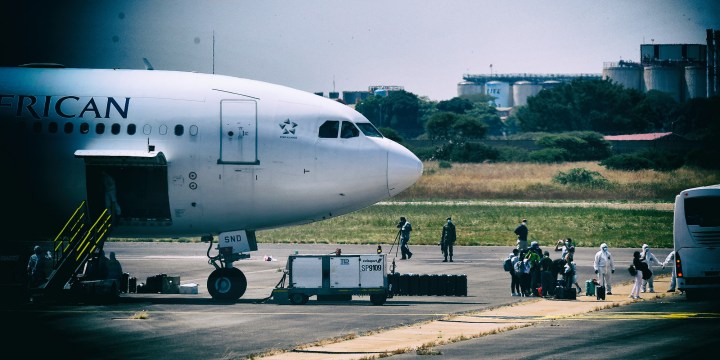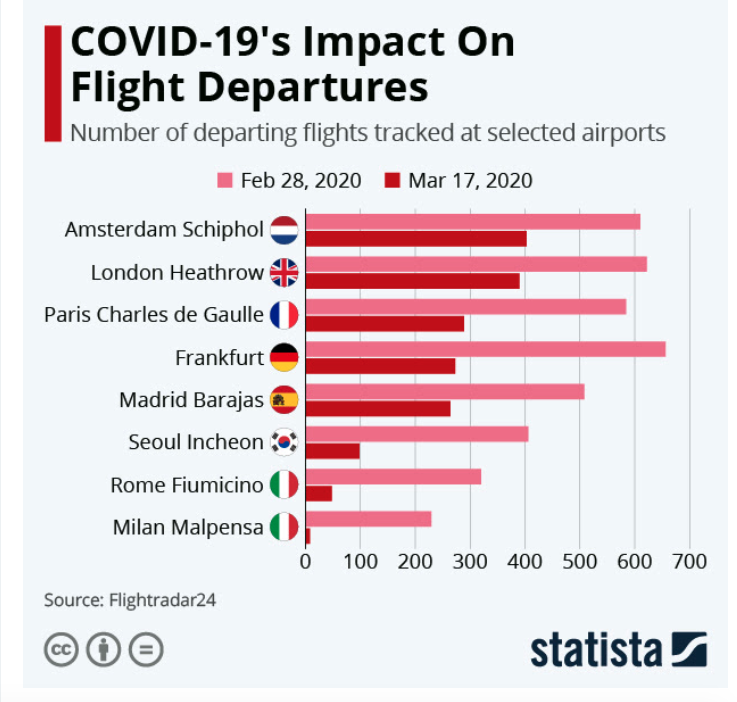BUSINESS MAVERICK
Global aviation industry faces a fiscal cliff

The coronavirus pandemic will take casualties, and these will extend beyond human life to business. Without government support, the already fragile airline industry may be an early victim.
While troubled state-owned airline SA Express has grounded its fleet, national carrier SAA has resorted to dramatically cutting routes and flight frequencies in response to lower travel demand and travel restrictions caused by the spread of the coronavirus.
They are not alone. The global aviation industry, which was fragile before the viral outbreak, is facing a crisis of epic proportions and is calling on governments across the world for support.
Airlines have been forced to curtail flights. Countries with more than 100 cases of Covid-19 account for 82% of global passenger revenues and those with more than 10 cases contribute another 12%.
SAA is aggressively reviewing its schedule to match capacity with the demand to the extent it’s possible.
“Where feasible, we will consider options that include cancelling and merging flights,” said SAA chief commercial officer Philip Saunders.

Between March 17 and 31 March 2020, SAA has cancelled a total of 162 flights. Of these, 38 are international and 124 are regional (destinations on the African continent) flights.
While SAA provided no detail on the economic impact of this, what is known is that even before Covid-19, SAA and much of the airline industry was fragile. Of about 120 airlines surveyed by IATA, the trade association for the world’s airlines, just 30 airlines saw any growth in profits in 2018, according to Brian Pearce, chief economist at IATA.
As SAA knows only too well, when planes are flying routes that are not profitable or are not flying at all, cash is burnt at unsustainable rates. According to IATA, 75% of airlines surveyed had cash reserves at the beginning of 2020 to last for three months maximum; at this point, they are running short fast.
A cash crunch appears inevitable without government support.
None of them, Pearce says, have sufficient cash or assets that can easily be converted to cash, to meet their liabilities (leases etc).
The most cash-flush are the North American and Middle Eastern airlines which have a quick ratio of 0.8x – industry jargon for $0.80c of liquid assets available to cover each $1 of current debt.
African and Southern American airlines are worst off with roughly $0.50c of liquid assets available for each $1 of current debt.
With no end to the crisis in sight, IATA is calling on governments around the world to take measures to protect the industry.
There are a number of steps that can be taken, said IATA’s director-general, Alexandre de Juniac, who was addressing the media via a conference call.
One that is crucial for global supply chains concerns air cargos.
“The measures that governments have introduced to restrict travel are shrinking the size of passenger operations which is also removing significant cargo capacity from the system,” he says.
This capacity is essential to keep supply chains going, including the delivery of critical medicines and medical equipment.
IATA is calling for governments to exempt crew — who do not interact with the public — from quarantine, to grant temporary traffic rights where needed, to keep air cargo excluded from travel restrictions, along with other practical measures.
IATA is also asking for regulators around the world to suspend the 80-20 rule during this time to allow airlines to reduce frequencies at congested airports. The rule requires airlines to use their stipulated slots, particularly at the busier airports, at least 80% of the time, or risk losing them.
The US Federal Aviation Administration and the EU government have responded to the plea and have waived minimum slot use requirements until May and June respectively.
“The world is facing a huge challenge to prevent the spread of Covid-19 while enabling the global economy to continue functioning,’’ De Juniac said.
“Airlines are on the front line of that challenge and it’s essential that the regulatory community work with us to ensure airlines are able to operate in the most sustainable manner, both economically and environmentally, to alleviate the worst impacts of the crisis.”
IATA is asking for other relief measures too. For instance, it is calling for a reduction in the costs that airlines face at airports.
This will be palliative care only. Faced with a crisis of these proportions, such savings will not pull the airline industry back from the financial brink. On 5 March IATA estimated that industry revenues could take a hit of up to $113-billion.
“This was as a result of what we thought then would be a worst-case scenario,” says De Juniac. “We could not have foreseen the developments of the last days with massive restrictions on travel being put in place… and with no clear understanding of how long they will remain in effect.”
Governments can help to avoid an industry calamity, he says.
Measures suggested include direct financial support for carriers to compensate for reduced revenues; loans or loan guarantees for the corporate bond market by the government or central bank and tax relief via rebates or a suspension on all employer imposed payroll taxes paid to date with an ongoing review for the rest of 2020.
Whether the SA government has the fiscal space to implement any of these measures is a moot point.
That said, a functioning aviation system is important.
“Connectivity is crucial,” said De Juniac. “The world will get through this crisis. And when it does, it will need a functioning air transport sector. Without financial relief that is not guaranteed.” BM
*A response from Acsa had not been received at the time of publication. The story will be updated if/when the response arrives.




















 Become an Insider
Become an Insider